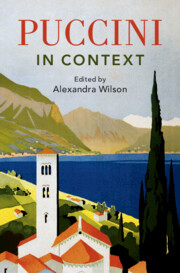Book contents
- Puccini in Context
- Composers in Context
- Puccini in Context
- Copyright page
- Contents
- Figures
- Table
- Notes on Contributors
- Preface
- Part I Formative Influences
- Part II Puccini’s Places
- Part III Influences and Interests
- Part IV Bringing Puccini to the Stage
- Part V Image and Reputation
- Chapter 19 Puccini in Pictures
- Chapter 20 Puccini’s Italian Critics
- Chapter 21 Memorialisation and Biography
- Part VI Puccini through a Political Lens
- Part VII Interpreting Puccini
- Part VIII Legacy
- Bibliography
- Index
Chapter 20 - Puccini’s Italian Critics
from Part V - Image and Reputation
Published online by Cambridge University Press: 31 August 2023
- Puccini in Context
- Composers in Context
- Puccini in Context
- Copyright page
- Contents
- Figures
- Table
- Notes on Contributors
- Preface
- Part I Formative Influences
- Part II Puccini’s Places
- Part III Influences and Interests
- Part IV Bringing Puccini to the Stage
- Part V Image and Reputation
- Chapter 19 Puccini in Pictures
- Chapter 20 Puccini’s Italian Critics
- Chapter 21 Memorialisation and Biography
- Part VI Puccini through a Political Lens
- Part VII Interpreting Puccini
- Part VIII Legacy
- Bibliography
- Index
Summary
This chapter discusses the Italian critics who wrote about Puccini’s music during his lifetime. Though dilettante writers showered Puccini with praise, more rigorous music critics of his era took a rather more sceptical view of his compositional merits. Puccini’s career coincided with the development of professional music criticism in Italy and also with the rise of musicology as an academic discipline. Significant critics discussed in this chapter include Amintore Galli, Filippo Filippi, Luigi Torchi, and Luigi Alberto Villanis. Particular attention is paid to Fausto Torrefranca, the author of a denunciatory and scathing text called Giacomo Puccini e l’opera internazionale, which blamed Puccini for many of the ills of the modern musical world. Many young critics of the era, such as Torrefranca, Giannotto Bastianelli and Ildebrando Pizzetti, associated Puccini with a backward-looking bourgeoisie and were keen to promote avant-garde Italian music, as well as non-commercial music from the more distant past. Puccini found approval amongst a new generation of pro-Fascist critics during the 1920s. Time and again, Puccini found himself dragged into debates about politics and national identity that went far beyond music.
- Type
- Chapter
- Information
- Puccini in Context , pp. 162 - 169Publisher: Cambridge University PressPrint publication year: 2023

